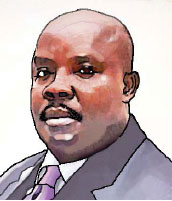By Emeka Alex Duru
(08054103327)
There comes a time when everything seems to go wrong for an individual or a system. In such a situation, even the best of intentions may not yield the expected results. For an individual, it may seem as if he is making a step forward and two backwards. For an entity, it is a period of stagnancy in growth or at worst, losing all that had been built in the past. At that point, everything goes the axiomatic south.
Nigeria is currently in such a sore state. In the last couple of years, virtually everything the country had boasted of, has been on steady slide. At home and abroad, the citizens have slipped from the excitement that trailed the return to the civilian dispensation in 1999, to palpable state of despondency.
In 1999, men and women, the weak and the strong, had leapt in joy at the onset of democracy, hoping as it were, that the country had entered into a new dawn. They had enthused that they had exited the military era characterized by dictatorship, abuse of due process and scant regards to the rule of law. The estimation was that in the new era, there would be life in abundance. The entire hopes however seem forlorn. Or misplaced.
This accounts for the unusual upsurge in Nigerians and families leaving the country in droves in search of new life abroad. Some even risk adventures to countries that are poorer than Nigeria, just driven by one purpose – to stay out of the system that has been marked by uncertainties; where life has increasingly lost its value.
When therefore you see Nigerians looking towards a war-torn country of Libya or making the suicidal mission of travelling to Europe through the sea in ramshackle boats, you really need to pity than condemn them. They are in their desperate and last-ditch effort for survival.
In that context, every Nigerian, everywhere outside the country, is seen as an economic migrant; a refugee of sort. When therefore, America listed Nigeria among the countries it imposed visa ban on, Donald Trump and his kinsmen were simply telling us who we are or what they are thinking of us. On Friday, January 31, 2020, the Trump administration officially imposed an immigrant visa ban on six countries including Nigeria. Other countries affected by the policy which is to take effect from February 21, include Sudan, Tanzania, Eritrea, Myanmar and Kyrgyzstan. The ban will not apply to official, business and tourism visas. The initial assumption was that Nigeria and Tanzania were added to the list because of the number of people who come from the two countries and end up illegally staying in the United States.
American officials have however explained why we were affected by the ban. They allege that Nigeria does not comply with the established identity-management and information-sharing criteria assessed by the performance metrics; that we do not adequately share public-safety and terrorism-related information, which is necessary for the protection of the national security and public safety of the United States. They also accuse Nigeria of presenting a high risk, relative to other countries in the world, of terrorist travel to the United States. In effect, they accuse us of not properly monitoring the terrorism index in the country.
Many Nigerians, especially those sympathetic to the Muhammadu Buhari administration, have not been finding the verdict by the United States funny. They see it as an indictment and even question the moral planks upon which the US stands to judge the terrorism credentials of another country. In the 2001 terror attack on America by Osama bin Laden and his group, most of the terrorists were discovered to be from Saudi Arabia. America is still doing business with Riyadh. The US has not been seen as being entirely innocent of developments in Yemen, lately. Even the late Saddam Hussein, who at a time turned out its nemesis, was seen as a creation of the US during the long years of the Iran-Iraq crisis. America may not therefore in the right sense of the word, be in the best position to pass judgement on Nigeria on issues pertaining to terrorism, they argue. But these are matters discussed in hushed tones and muffled voices.
The fact is that in pronouncing the visa ban on us, we are hit very hard by the US. To be sure, issuance or denial of visa to a potential visitor, falls within the sovereign rights of the issuing state. The State is not under obligation to issue visa to any citizen of another country, going by customs and conventions in international law. It is, thus, purely a matter of discretion and internal policy of the issuing authority.
That America has slammed visa ban on Nigeria, may therefore not be the issue. The big issue rather, is the class of countries we were lumped in the same basket in the measure. That Nigeria which had led the pace in the decolonization and independence struggles in Nigeria, could be grouped with Sudan, Eritrea, Myanmar and Kyrgyzstan, on matters pertaining to terrorism, speaks much on the level at which we have come low in global ranking and reckoning. In 2018, the US issued more than 8,000 immigration visas to citizens of Nigeria – twice as many as all the other five nations combined. That same year, just over 2,000 were issued to Sudanese nationals, 290 to Tanzanians, and just 31 to Eritreans. Two years later, we are at ground zero with the countries. The pronouncement simply tells us that we are no longer there.
Our coming this low may not have been solely on account of the flip-flops of any particular administration. It is a result of years of indiscretion and poor management of our internal affairs. William Shakespeare, is right in his assertion that “There is a tide in the affairs of men, which taken at the flood, leads on to fortune; Omitted, all the voyage of their life is bound in shallows and in miseries”. We did not make the best use of our time and resources when they mattered most. We did not make hay while the sun shone. We rather acted Nero who played the fiddle while Rome burnt.
What the Buhari administration, in its regular policy missteps has done, is in presenting Nigeria raw to the outside world. When the government rides roughshod on the citizens, the international community takes note. When the authorities rig elections and pretend that all is well, we are being watched by others. When we throw ‘repentant’ terrorists into the society and even, of all places, in our armed forces, we are casting huge question marks on our claims of fighting insurgency. When an Inspector General of Police confesses not knowing the number of men under him, we are sending a coded message abroad. When a President casually expresses surprise at the murderous activities of terrorists in a system under his watch, we may not appreciate the import of the statement. There are other things we do that we think do not matter. But they do. They account for the visa ban and who we are.














